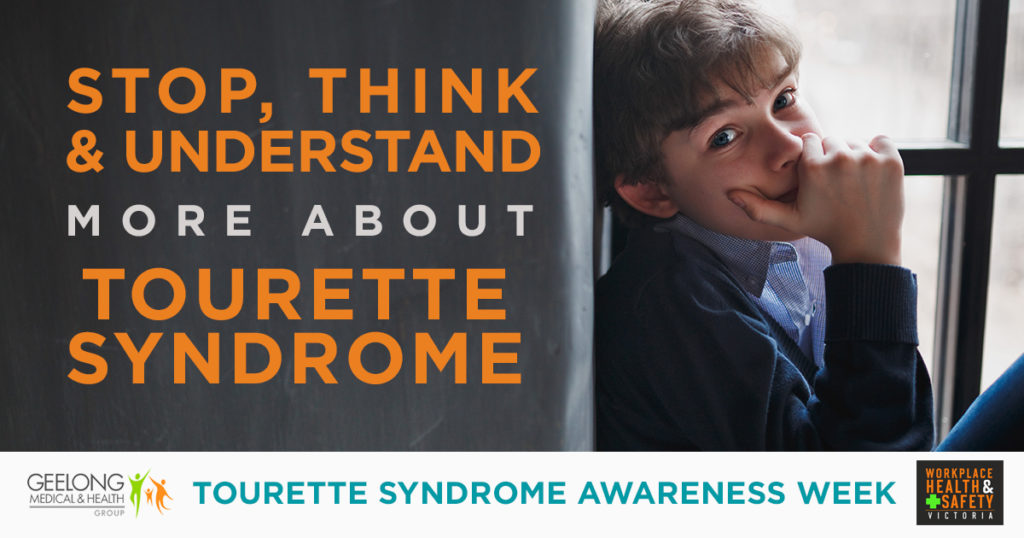Tourette Syndrome (TS) is a neurological disorder, which most often begins between the ages of 2 and 21, and lasts throughout life. TS is NOT degenerative and people with TS can expect to live a normal life span.
What are the symptoms?
TS is characterised by rapid, repetitive and involuntary muscle movements and vocalisations called “tics”, and often involves behavioural difficulties. The term “involuntary”, used to describe tics, is a source of confusion since it is known that most people with TS do have some control over their symptoms. What is often not recognised is that the control which can be exerted, from seconds to hours at a time, only delays more severe outbursts of symptoms.
Tics are experienced as a build up of tension, are irresistible and eventually must be performed. Typically tics increase as a result of tension or stress and decrease with relaxation or concentration on an absorbing task. TS symptoms have long been misconstrued as a sign of behavioural abnormality or “nervous habits”, which they are not.
How are tics classified?
The two categories of the tics of TS and some common examples are:
SIMPLE
- Motor – eye blinking, head jerking, shoulder shrugging, facial grimacing, nose twitching
- Vocal – throat clearing, barking noises, squealing, grunting, gulping, sniffing, tongue clicking
COMPLEX
- Motor – jumping, touching other people and things, twirling about, repetitive movements of the torso or limbs, pulling at clothing and self-injurious actions including hitting or biting oneself
- Vocal – uttering words or phrases, coprolalia (the involuntary utterance of inappropriate or obscene words), echoalia (repeating a sound, word or phrase just heard) or palilalia(repeating one’s own words)
The variety and complexity of tics or tic-like symptoms that can be seen in TS is enormous.
Do people with TS have all of these symptoms or just some of them?
People with TS rarely have all of these symptoms. Most people will exhibit some or many symptoms over a long period of time and in varying degrees: mild, moderate or severe. In milder cases a person may have just a few tics or twitches, which may be confined to the face, eye and shoulder areas. In more severe cases several areas of the body may be affected.
The symptoms wax and wane, in some cases from day to day but more commonly over 3 to 4 month periods. The waxing and waning pattern can sometimes be frightening to people with TS who may find it difficult to understand the sudden intensification or waning of symptoms.
Are there behaviour problems which may occur frequently in addition to tics?
Yes, but not always. Additional problems may include:
Obsessive Compulsive Disorder (OCD), in which the person feels that something must be done over and over. Examples include touching an object with one hand after touching it with the other to “even things out” and repeatedly checking to see that the flame on the stove is turned out. Children sometimes repeat a sentence or action many times until it is “just right”. OCD can include counting rituals, obsessive preoccupations or thoughts which are unpleasant.
Attention Deficit &/or Hyperactivity Disorder (ADD/ADHD) may include difficulty in concentrating, being easily distracted, failing to finish tasks, acting on impulse, not seeming to listen, shifting constantly from one activity to another, needing a great deal of supervision, being unable to sit still, calling out and lack of self-control. Adults may have residual signs of ADD such as overly impulsive behaviour and concentration difficulties. Learning Difficulties such as dyslexia, arithmetic and perceptual difficulties, handwriting problems.
Behavioural problems may include compulsive and repetitive behaviours, attention problems, sleep difficulties, depression, poor self-esteem, poor school performance, social isolation, school and social phobia. Some commonly observed problems include oppositional/defiant behaviour, aggressive and uncooperative behaviours.

